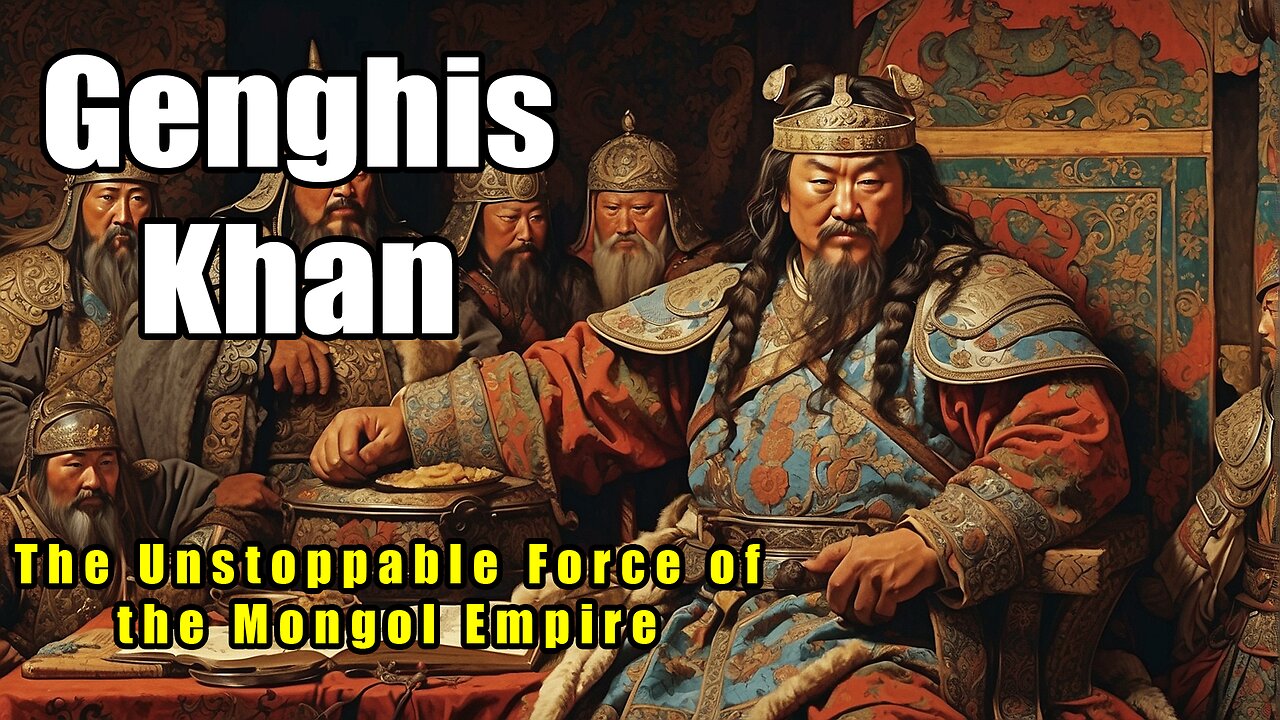Premium Only Content

Genghis Khan: The Unstoppable Force of the Mongol Empire (1162 - 1227)
Genghis Khan, born in 1162 and passing away in 1227, was the founder and ruler of the Mongol Empire, one of the largest contiguous empires in history. Born as Temüjin, he united the Mongol tribes through military conquests and strategic alliances, eventually assuming the title of Genghis Khan, which means "universal ruler."
Under his leadership, the Mongol Empire expanded rapidly, conquering vast territories across Asia and Europe. Genghis Khan's military strategies were innovative and ruthless, utilizing superior cavalry tactics and effective siege warfare. His armies were known for their speed, mobility, and discipline.
Despite his reputation as a fearsome conqueror, Genghis Khan also implemented administrative reforms that promoted religious tolerance, meritocracy, and communication across his vast empire. His rule facilitated cultural exchange and trade along the Silk Road, contributing to the spread of ideas, technologies, and goods.
Genghis Khan's legacy continues to be debated, with some viewing him as a brutal tyrant and others as a visionary leader who laid the foundation for centuries of Mongol dominance in Eurasia. Regardless, his impact on world history is undeniable, shaping the geopolitical landscape of his time and beyond.
-
 1:28:13
1:28:13
Kim Iversen
18 hours agoCancelled Chef Pete Evans Exposes The One Change That Could End Big Food and Pharma
105K94 -
 4:20:21
4:20:21
Nerdrotic
19 hours ago $84.29 earnedDaradevil Born Again, Comics Industry CRASH, Neu-Hollywood REBUILD | Friday Night Tights #337
257K65 -
 1:32:34
1:32:34
Glenn Greenwald
16 hours agoThe Future of Gaza With Abubaker Abed; Journalist Sam Husseini On His Physical Expulsion From Blinken’s Briefing & Biden’s Gaza Legacy | System Update #391
137K101 -
 1:34:48
1:34:48
Roseanne Barr
18 hours ago $27.49 earnedWe are so F*cking Punk Rock! with Drea de Matteo | The Roseanne Barr Podcast #83
105K87 -
 1:08:20
1:08:20
Man in America
19 hours ago🇨🇳 RedNote: A CCP Trojan Horse Deceiving Americans? w/ Levi Browde
59K76 -
 3:55:11
3:55:11
I_Came_With_Fire_Podcast
22 hours agoTrump SABOTAGE, LA FIRE CHIEF SUED, and BIDEN’S LAST F-U!
39.5K15 -
 2:59:47
2:59:47
Joker Effect
13 hours agoUkraine in a video game? Hardest thing I have done. S.T.A.L.K.E.R.2 Heart of Chornobyl,
121K8 -
 1:15:22
1:15:22
Flyover Conservatives
1 day agoEczema, Brain Fog, B.O., and Gas… Eating Steak and Butter Creates Ultimate Health Hack - Bella, Steak and Butter Gal | FOC Show
90.8K8 -
 51:58
51:58
PMG
17 hours ago $3.73 earned"Can the Government Learn from Elon Musk’s 70% Labor Cut? A Deep Dive into Inefficient Agencies"
62.7K3 -
 6:39:15
6:39:15
Amish Zaku
17 hours agoRumble Spartans #10 - New Year New Maps
52.1K3